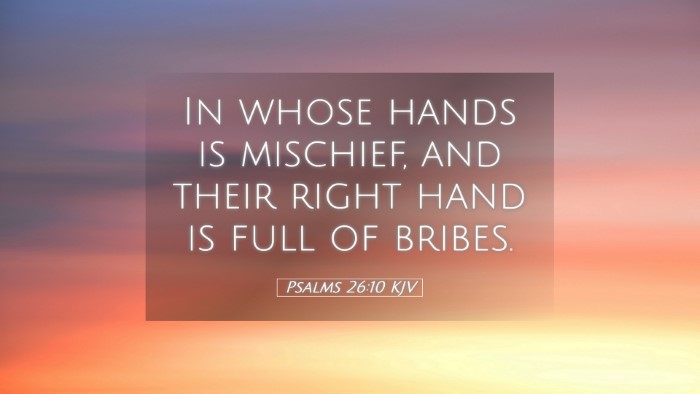Psalms 26:10 - Commentary
Verse: "In whose hands is mischief, and their right hand is full of bribes."
Introduction
Psalm 26 is a significant declaration of the psalmist's integrity and the pursuit of righteousness. In verse 10, the psalmist contrasts himself with those who engage in wickedness and corruption. This verse offers rich insights for pastors, theologians, and scholars to explore the themes of integrity, accountability, and divine justice.
General Commentary
The psalmist distinguishes himself from the corrupt, acknowledging their deeds and the danger they pose. It serves as a reminder of the morality inherent in the community of God's people and their call to holiness.
Insights from Matthew Henry
Matthew Henry highlights that in this verse, "the character of the wicked is drawn." He notes that the "hands" signify the actions and the moral influence of individuals. The psalmist characterizes the wicked as those whose actions are inherently corrupt, suggesting that their entire approach to life is marred by mischief and deceit.
Henry emphasizes that the right hand, often symbolizing strength and authority, is "full of bribes," indicating a tendency to pervert justice for personal gain. This mirrors today's reality, where some are willing to compromise ethics for power. The integrity of the faithful contrasts sharply with such behavior, reminding believers of the importance of remaining steadfast in righteousness.
Reflections from Albert Barnes
Albert Barnes provides a contextual analysis of this verse, stressing that "mischief" serves as a metaphor for the destructive behaviors that arise in a morally bankrupt society. He connects this to the broader narrative of the psalm, where the psalmist seeks vindication against those who thrive in injustice.
- Mischief and its Effects: Barnes underscores that mischief not only harms the perpetrator but also creates chaos within the community. It dismantles trust and erodes integrity, leading to a culture of suspicion and fear.
- Bribery and Corruption: The act of bribery is depicted as the antithesis of justice. Barnes notes that the right hand's fullness of bribes points to a premeditated effort to influence and corrupt justice, demonstrating a systemic issue that the psalmist confronts.
- Integrity of the Believer: Contrast is a vital theme in Barnes' interpretation. He argues that the psalmist’s claim of personal integrity opposes the actions of the wicked, highlighting the importance of maintaining a blameless character in the face of pervasive influences.
Analysis from Adam Clarke
Adam Clarke extends the discussion of bribery, noting that bribery has deep-rooted implications in judicial systems, where justice can be subverted by personal gains. Clarke reflects on the ancient context of the psalm, where judges and rulers were often swayed by offerings that compromised their moral duties.
Furthermore, Clarke offers a theological angle, asserting that the presence of evil and corruption serves as a backdrop against which God's righteousness is revealed. He posits that it is through recognizing and denouncing these vices that individuals can truly appreciate and cling to their faith in God’s justice.
Theological Implications
The themes of Psalms 26:10 remind contemporary believers to engage critically with societal norms that perpetuate injustice. The verse calls for a faithful witness that resists corrupt systems and advocates for righteousness.
- The Call to Integrity: Believers are encouraged to commit themselves to transparency and accountability both personally and within their communities.
- Justice and Advocacy: The example of the psalmist urges the faithful to advocate for just practices, standing firm against corruption and mischief in all forms.
- Spiritual Reflection: The psalmist’s declaration becomes a mirror for self-examination, prompting believers to examine their hearts and actions in light of God’s holiness.
Practical Applications
Understanding Psalms 26:10 equips pastors, students, and scholars with insights that can be applied in various contexts. Here are practical applications to consider:
- Preaching Righteousness: Pastoral leaders can utilize this verse to preach the necessity of integrity and the dangers of compromising one's moral values.
- Educational Discussions: In theological education, this verse can be explored within the framework of ethical biblical leadership, addressing the real-life implications of bribes and corruption.
- Community Engagement: Encourage congregations to engage in social justice initiatives that aim to counteract the influences of corruption within their societies.
Conclusion
Psalms 26:10 serves not only as a reflection on the nature of the wicked but also as a powerful affirmation of the believer’s quest for righteousness. By drawing from the wisdom of Matthew Henry, Albert Barnes, and Adam Clarke, we gain a fuller understanding of the implications of this verse on personal integrity, social justice, and the divine call to live set apart for God’s purposes.


